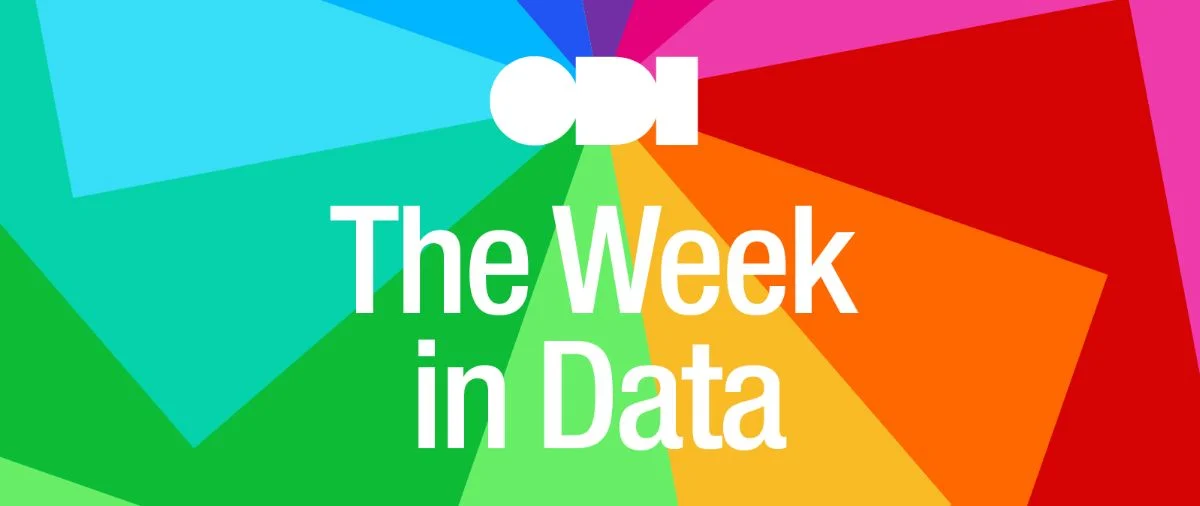
Hello, This week, for Disability History Month, Miro Griffiths (Research Fellow, policy adviser and disabled activist) guest edits The Week in Data, highlighting the importance of data to create evidence to push for a more accessible and inclusive society
Understanding disabled people’s social position is complex. In all my roles, I have responsibility for resisting the social injustices encountered by the disabled people’s community. This means accessing and interpreting data, followed by embedding available evidence within the demands, strategies, and activities that pursue the realisation of accessible and inclusive societies. Data matters because it guides our understanding of the problem and makes possible the alternative and – perhaps – preferable routes to bring about solutions. The question that must be asked, persistently, is: how does data contribute to the emancipation of disabled people?
Here are a few recent articles to reflect on this further…The United Nations Committee on the Rights of Persons with Disabilities has called on interested parties to input on the drafting of the latest General Comment, which is focused on disabled people’s right to work and employment. General Comments provide guidance and proposals for realising the Articles within the Convention on the Rights of Persons with Disabilities. This approach demonstrates the importance of data collection: individuals and organisations collaborate to propose inclusive strategies, data is extracted from projects, research publications, and documents from the convention reporting cycles, to show social change is possible.
Ensuring data is accessible and meaningful to disabled people’s organisations is crucial for emancipation. The Kenyan government recently launched its action plan on the collection, analysis, and application of data on disabled people, which prioritises the involvement of civil society organisations. This approach is part of the Inclusive Data Charter, part of the 2030 Agenda for Sustainable Development. This aims to collect granular data to understand the marginalisation of communities across the globe. Nevertheless, data on the sustainability of disabled people’s organisations appears bleak – particularly in the global south. Such organisations require resource, influence, and valued positions in determining agendas, priorities and demands for inclusion.
The latest edition from the Feminist Republik highlights, through disabled people’s stories, the importance of contesting and redefining notions of justice, equality, and freedom. Research design frameworks, data collection pursuits, and the interpretation of data outcomes must be guided by disabled people’s representative bodies.
We need to be aware of disabled activists who have concerns about how data can be used to further surveillance measures. And conscious of how data can be used to ignore, and dismiss, the significance of disabled people’s lives. It was frustrating to read aboutthe absence of disability within COP26 proposals. John Pring argues in the Disability News Service that there is disregard for the impact of climate change on disabled people. This is not a surprise. Repeated demands – from the International Disability Alliance to Human Rights Watch – call for embedding data on disability within climate mitigation plans. The message is clear when such data is absent: no place exists for disabled people in the future.
I want to be provocative. I fear that, too often, many of us in research and policy are trapped in irresolvable debates surrounding the development of the ‘right’ or ‘best’ indicators for measuring equality. These debates areimportant but should never be at the expense of engaging with data currently available. I am drawn to the importance of human rights, advocacy, and participation in policymaking when reviewing existing datasets, such as the Office for National Statistics disability outcomes. Peter Torres Fremlin, in discussion with Jennifer Madans, makes for interesting reading as they explore the opportunities and limitations of gathering disability data. To echo the words of Mark Priestley and Stefanos Grammenos: ‘imperfect statistics sometimes have strong policy effects’.
Miro Griffiths MBE Leverhulme Early Career Research Fellow, University of Leeds Follow us on Twitter at @ODIHQ
From the outside world
Call for submissions for General Comment on article 27 on the right of persons with disabilities to work and employment Office of the High CommissionerThe Committee on the Rights of Persons with Disabilities is developing a draft General Comment on article 27 and is calling for input from interested parties
Kenyan government takes census of disabled population Kenya News
The Kenyan government launches a programme to gain a better dataset on their disabled population
NHS Trust questioned about whether patients consent to surveillance measures DNS
Mental-health service users have questioned a London trust’s use of the Oxevision monitoring system on its womens’ mental health wards, to watch patients in their beds
Disabled populations ‘hardly considered’ in climate change responses International Disability Alliance
The IDA explores the problems in missing analysis of how COP26 addresses the global disabled population
Data on disability: beyond key stats like ‘the 15%’, with Jennifer Madans Disability Debrief
A deep dive from Peter Torres Fremlin into how we collect disability data, and how it can be used to create meaningful change
ODI Canalside Chats – The rise of the chief data officer
Join us for a free in-person event on Monday 6 December (12:00–13:00, Kings Place, King’s Cross London) to hear expert speakers Barry Green and Lisa Allen discussing the role of the chief data officer
Could ‘bottom-up data trusts’ help to tackle the climate crisis?
In partnership with the Global Partnership for AI, the Aapti Institute and the Data Trusts Initiative, we assess the feasibility of creating new, ‘bottom-up data trusts’ to tackle the climate crisis
Asimov and data revelation mechanisms
The ODI’s Public Policy team is undertaking an ambitious new international project, called ‘Experimentalism and the Fourth Industrial Revolution’. In Part 2 of our Asimov workstream, we explore opportunities for innovation and experimentation in the context of data policy and practice in the UK